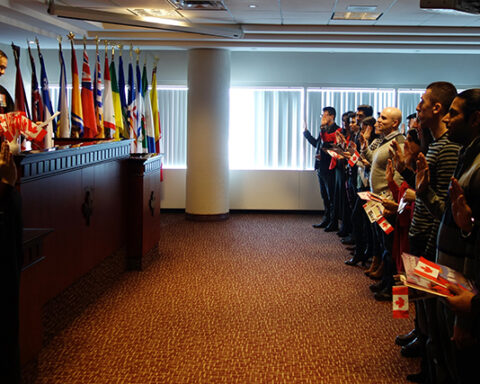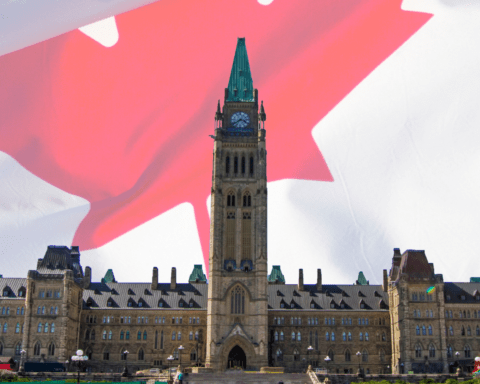The first significant changes to Canada’s Citizenship Act in almost four decades will make it more difficult for new immigrants to become Canadian citizens, seek to prevent immigration fraud and encourage Canadians to take more pride in their citizenship, said Citizenship and Immigration Minister Chris Alexander. The new rules, proposed in the Conservative government’s bill C-24, the Strengthening Canadian Citizenship Act, were announced on Feb. 6 and will toughen the rules for those wanting to be Canadian.
But while the changes mark a new era for Canada’s citizenship rules, they’re leaving many Canadian immigrants with a sense of unease. “My parents immigrated to Canada from Grenada and one of the reasons they chose to come here is because they knew Canada welcomed and valued immigrants,” said Fabian Aird, 35. “Had these rules been in effect then, I don’t know if they would have been able to come, and I would never have been born here and living here now. Our lives would be very different.”
Others shared the same sentiment. “I came here from Lebanon over thirty years ago. My family knew Canada was supposed to be an easy place to get citizenship and that it was a friendly, welcoming country,” said Camille Romano. “But will today’s immigrants feel the same way? I’m not sure if these rules will actually help prevent fraud and immigration troubles. It might just keep good people out.”
Janice Urrelys Pérez Silverstein recently got married and is currently sponsoring her husband who lives in Cuba to become a Canadian citizen. While it isn’t clear how the changes will affect those who sponsor family members, she said the problem is the message that this sends to potential new immigrants.
“They make immigrating to Canada more and more difficult and people need to jump through hoops in order to apply. Raising the costs is obviously absurd, in my opinion, as it deters the applicant to want to apply,” she said.
“If they moved to Canada, the goal is to become a citizen and they have already been through a lot to be permitted to immigrate, and then they have to go through more hardship to actually become a citizen …”
Tougher criteria
One of the proposed changes is lengthening the amount of time applicants need to live in Canada. Previously, residents applying for citizenship only needed to live for three out of four years in the country; now, residents would need to live at least four out of six years in Canada and be physically present for at least half a year, as well as declare an “intent to reside” in Canada and file Canadian income taxes for those years.
Another key change is the stricter language requirements. Previously, only adults aged 18-54 had to complete an English or French language proficiency test and could use the help of an interpreter. The changes would mean applicants aged 14 to 64 will have to demonstrate proficiency in either language, without an interpreter.
The new changes would also allow the government to withdraw citizenship from dual citizens convicted on terrorism charges. This is one of the most significant changes, and gives the government the power to revoke citizenship from Canadian dual citizens who are convicted of terrorist activities and deny citizenship to permanent residents who are involved in terrorist activities.
The changes also increase the government’s powers. According to the new rules, the Citizenship and Immigration Minister would have the power to revoke one’s citizenship without a court hearing if the application contained false information. Currently, applicants are given a court hearing.
To prevent immigration fraud (for example, lying on an application about how long you’ve been in the country or not declaring a criminal record), the new changes propose that those falsifying their applications be fined up to $100,000 and/or result in five years in prison, a major change from the current $1,000 fine and/or maximum of one year in prison.
As well, another hurdle immigrants will have to overcome is higher application fees.The fee to apply for Canadian citizenship, which has not changed in 20 years, would increase to $300.
Ending the backlog
While critics have pointed out that the changes — the first comprehensive reforms to the Citizenship Act since 1977 — make it more difficult to become a Canadian citizen, government officials like Mr. Alexander said it will help ensure that those applying for citizenship actually intend to live in the country and integrate themselves in Canadian society. Hence, he said, the need for stricter language requirements and to declare intent to reside in Canada. “Citizenship is not a right, it is a privilege,” said the Minister after the bill was brought forth in Parliament last week.
As well, he said the stricter rules will help shorten wait times for citizenship. There is currently a backlog of over 300,000 applications, with some applicants waiting as long as two to three years for an answer. The stricter rules will help the government process all successful applications in under a year, and prevent them from keeping thousands of applicants in limbo.
Whether the new rules will hurt or harm those applying for citizenship remains to be seen, and is of particular concern to new applicants. “I think a lot of people think it’s easy to become a Canadian citizen. There’s this general idea that the Canadian government will accept anyone and it’s unfortunately not true,” said Mr. Aird. “Increasing the application fees, making people wait longer for citizenship, and giving even more arbitrary powers to the government just leaves them with a bad feeling about Canada. Is this really what’s best?”
For now, many potential immigrants are just trying to focus on the positive and move forward with their applications — especially before these new rules are put into place. “
Thinking about the bleakness of the situation will just cause depression,” said Ms. Silverstein, whose husband has to wait in Cuba. “People just have to keep on with it.”





